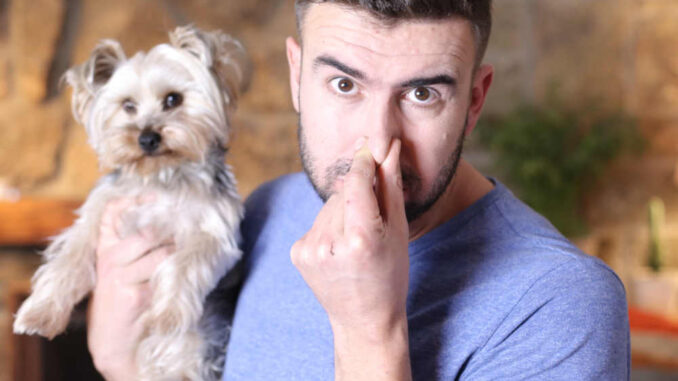
This article was updated on May 1st, 2023
It can be unsettling the first time you hear your dog’s stomach making gurgling sounds, but it’s usually not a big deal. Canine digestive systems often rumble as they push food and gas through the body. But, if the rumbling noises come with bad gas or other signs of an upset stomach, there may be more going on.
Is stomach gurgling normal? What if my dog has gas?
Stomach gurgling is a normal part of digestion. During the digestive process, gas forms when food gets broken down into usable nutrients. The smooth muscles in the gastrointestinal tract push digested materials and gas through the system, and this causes gurgling sounds.
If the gurgling is louder than usual or if your pooch suddenly has a lot of gas, it may mean he has an upset stomach. He may have eaten something that didn’t agree with him or gotten a bacterial infection. However, some dogs are naturally flatulent.
When should I worry?
If the symptoms are new and persist for more than a few days, or if your dog is showing other signs of illness such as vomiting or diarrhea, talk to your vet. Let’s review the most likely reasons and find out how to help your dog.
Why is my dog experiencing bad gas and stomach gurgling?
There are several reasons that a dog has bad gas and a gurgling stomach. In this article, we’ll focus on the major causes of a dog’s upset stomach that cause this combination of symptoms.
1. Dietary
Whether it’s your pup’s diet or another item that he ate, certain foods can cause the digestive tract to produce extra gas. Foods or diets that can cause gurgling and upset stomach include:
- High-fat foods or diets
- High-fiber foods
- Dairy products
- Cruciferous vegetables
- Certain spices
- Spoiled foods
- Poop or other things in the yard
- Anything that your dog has an allergy or food sensitivity to
2. Swallowed air
If your dog wolfs down his meals, he probably swallows excess air with the food. However, nervous dogs or brachycephalic breeds can also swallow a lot of air whether they eat too fast or not. Once the air goes in, it has to travel through the digestive tract and come out to the other end, creating flatulence and gurgling sounds.
3. Gastrointestinal disease
Gastrointestinal diseases can cause your dog to have bad gas and stomach gurgling. Bacterial overgrowth or inflammation in the digestive tract can be a result of certain illnesses.
- Inflammatory bowel disease
- Pancreatitis
- Intestinal parasites
- Gastrointestinal tumor
- Bloating or twisted stomach
- Intestinal malabsorption
4. Medicine
Some medicines can upset your dog’s stomach and cause gurgling and bad gas.
Four things you can try at home to help a dog with gas and a gurgling stomach
If you have a dog with bad gas and a gurgling stomach, there are some things you can try to alleviate the symptoms. In some cases, you’ll have to accept that your pup is naturally gassy. You can discuss the following with your veterinarian:
1. Change your dog’s diet
If the symptoms are sudden, you may want to start by fasting your dog for 1-2 meals and then feeding him a bland diet for a few days. For chronic gurgling and bad gas, try a diet with easily digestible ingredients or one that’s formulated for sensitive stomachs.
2. Supplement with probiotics/enzymes
By adding probiotics and/or enzymes to your dog’s diet, you help his system with digestion. This may reduce the amount of gas in the digestive tract and soothe your dog’s system.
- Help promote healthy digestive system
3. Use a slow-feed bowl
If your dog gulps his food or swallows air when he eats, try a slow-feed dog dish. You may be able to reduce excess gas in the gut.
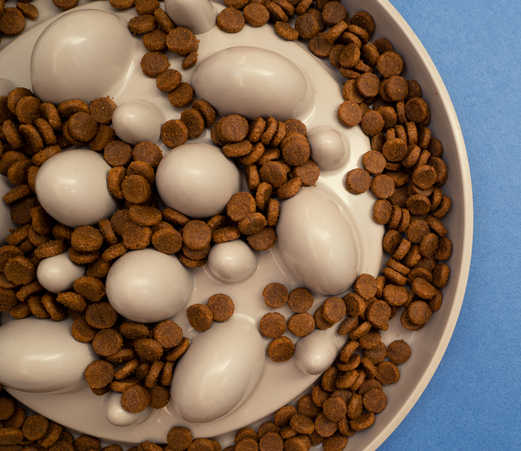
4. Sprinkle ginger on his food
Sprinkling a small amount of ginger on your dog’s food may help settle an upset stomach and reduce gas production. The spice helps reduce inflammation in the gut and support the gut.
When should you call your veterinarian?
A gurgling stomach alone is usually not a reason to contact your veterinarian. But if he suddenly has lots of bad gas, your dog may have an upset stomach. Many times, digestive upset will resolve in a few days. But you should call your veterinarian and schedule an exam if the symptoms persist or there are other signs.
- Diarrhea/vomiting for more than a few days
- Blood in the stool or vomit
- Loss of appetite for more than a few days
- Weakness and depression
- Drooling excessively
- A swollen or painful abdomen
How will a veterinarian treat a dog with stomach noises & bad gas?
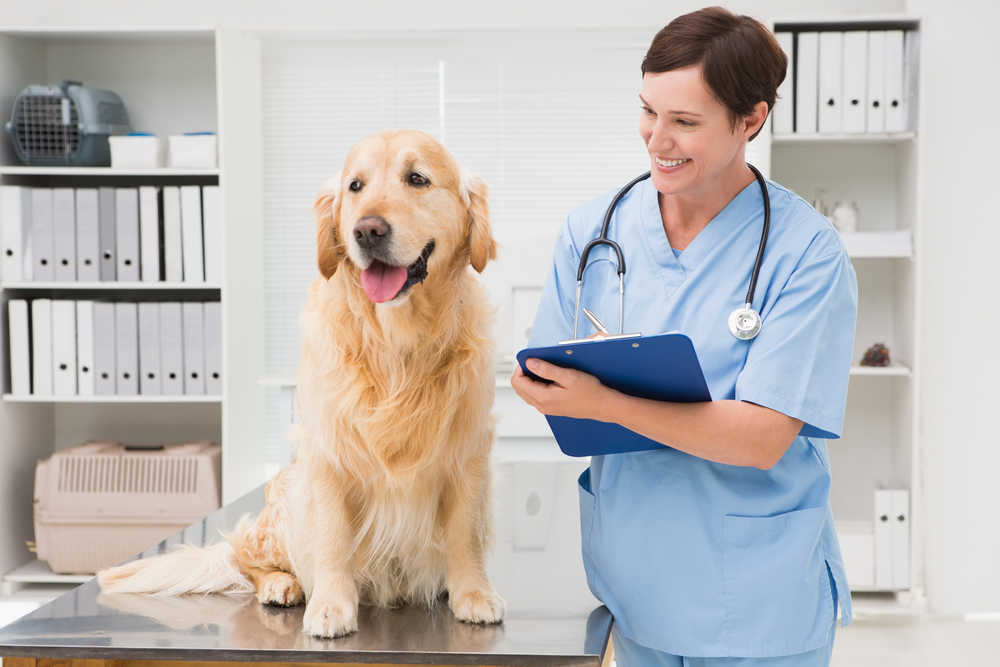
Veterinary treatment for stomach noises in your dog will depend on the underlying cause of the gurgling.
- Supportive therapy including IV fluids if your dog is dehydrated
- Withholding food for a day and then feeding a bland diet
- Anthelmintic drugs to eliminate gastrointestinal parasites
- Antibiotics for bacterial infections
- Medications to reduce gas and acid production
Frequently asked questions
What can cause bad gas in dogs?
Some dogs naturally have bad gas. For others, there are various causes including:
- High-fat diet
- High fiber
- Food sensitivity
- Bacterial infection
- Gastrointestinal disease
- Medicine
- A sudden change of diet
- Swallowing air
What can I give my dog for a gurgling stomach and bad gas?
If your dog has a gurgling stomach and bad gas, try fasting him for a day and then feeding him a bland diet. Once his system recovers, gradually switch your pooch to an easily digestible diet. You can also sprinkle a little ginger on his food to soothe an upset stomach.
Why is my dog’s stomach making noises?
Stomach noises known as borborygmi occur when gas moves through the digestive tract. The major causes of gurgling include digestive upset, swallowing air, hunger, or an underlying medical condition.
Related articles:






Disclaimer: This website's content is not a substitute for veterinary care. Always consult with your veterinarian for healthcare decisions. Read More.



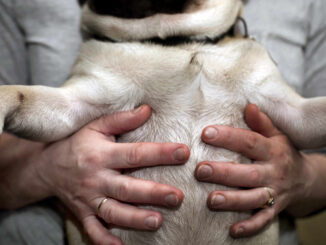
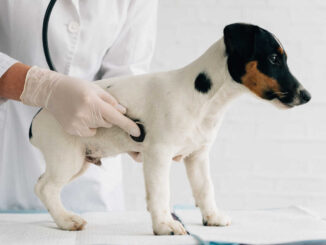

Be the first to comment